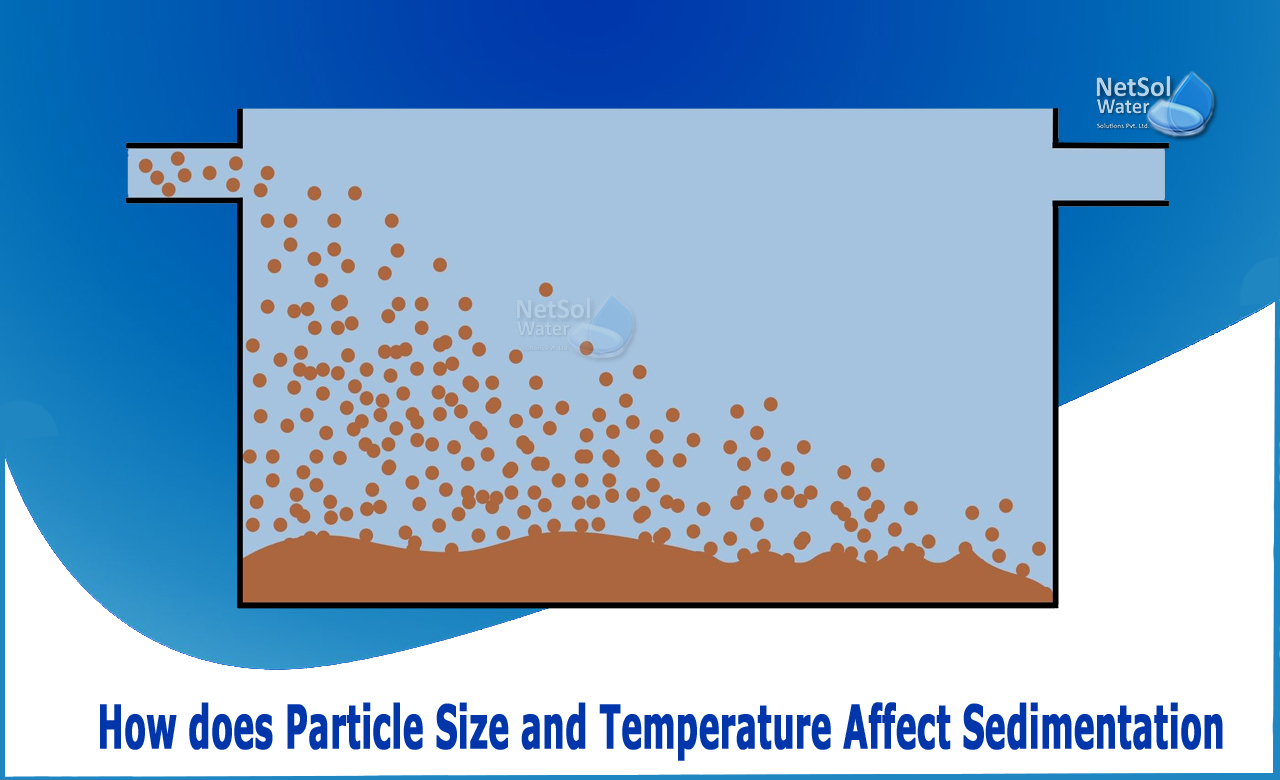How does Particle size and temperature affect Sedimentation?
Sedimentation, often known as clarifying, is the act of allowing suspended particles to settle naturally by gravity. Suspended materials might be particles from the source water, such as clay or silt. Most frequently, suspended material or floc is formed from wastewater and the chemicals employed in coagulation or other treatment procedures, such as lime softening. It takes place after coagulation and flocculation, but before filtering.
Sedimentation is performed by lowering the velocity of the treated wastewater to a point where the particles no longer remain suspended. Gravity will remove particles from the flow when the velocity no longer supports their travel.
Factors affecting Sedimentation
A variety of factors influence the separation of settleable materials from water. When unfavourable circumstances exist, more pretreatment may be required. The form and size of particles, particle density, water temperature, and particle charge, dissolved compounds in the water, environmental influences, and basin features are all factors that influence the sedimentation process.
The following are some of the more typical sorts of considerations to consider:
1: Size of the particle
The size and kind of particles to be removed have a considerable impact on the sedimentation tanks functioning. Sand and silt may be easily removed due to their density. The velocity of the water-flow channel may be reduced to less than one foot per second, and most of the gravel and grit will be eliminated by gravity.
In contrast, colloidal material, which is made up of microscopic particles that remain suspended in the wastewater and cause it to seem foggy, will not settle until it is coagulated and flocculated with the addition of a chemical, such as an iron salt or aluminium sulphate. The form of the particle influences its settling qualities as well. A spherical particle, for example, will settle considerably faster than one with ragged or uneven edges. Every atom has a small electrical charge. Particles having the same charge repel one another. This repellent effect prevents particles from aggregating into flocs and settling.
2: Temperature of the water
The temperature of the wastewater being treated is another issue to consider while operating a sedimentation basin. When the temperature drops, the pace of settling slows. As a result, the detention duration in the sedimentation tanks must increase as the water cools. As the temperature falls, the operator must adjust the coagulant dosage to compensate for the slower settling rate. Temperature has little to no influence on therapy in most situations. A wastewater treatment plant's flow demand is greatest during the summer, when temperatures are at their maximum and settling rates are at their finest. When the water is cooler, the flow in the plant is at its lowest, and the detention period in the plant is usually lengthened to allow the floc to settle out in the sedimentation basins.
Water currents of many sorts may occur in the sedimentation basin:
- Density currents are created by the weight of the solids in the tank, the concentration of solids in the tank, and the temperature of the water in the tank.
- Eddy currents induced by the flow of water entering and exiting the tank.
Currents can be useful because they enhance particle flocculation. Water currents, on the other hand, tend to spread the floc unevenly around the tank, causing it to settle out at an uneven rate. Some water current issues can be mitigated by designing the tank properly. The use of baffles helps to keep currents from short-circuiting the tank.
What do we offer?
Netsol Water is a significant water and wastewater treatment firm in India, offering WTP, WWTP, STP, ETP, RO Plant manufacture, among other services. We've made it our mission to save the planet. The company creates equipment’s and is committed to providing practical solutions that help businesses flourish.
Netsol Water is Greater Noida-based leading water & wastewater treatment plant manufacturer. We are industry's most demanding company based on client review and work quality. We are known as best commercial RO plant manufacturers, industrial RO plant manufacturer, sewage treatment plant manufacturer, Water Softener Plant Manufacturers and effluent treatment plant manufacturers. Apart from this 24x7 customer support is our USP. Call on +91-9650608473, or write us at enquiry@netsolwater.com for any support, inquiry or product-purchase related query.



